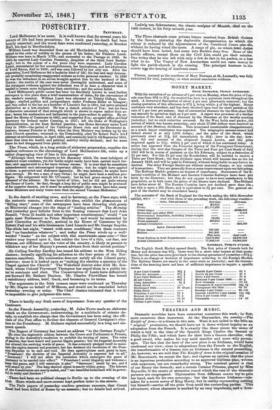POSTSCRIPT.
SATURDAY.
Lord Melbourne is-no more. It is well known that for several years his tenure of life had been precarious; for a week past his death had been hourly expected; and the worst fears were confirmed yesterday, at Brocket Hall, his seat in Hertfordshire. William Lamb was descended from an old Hertfordshire family, which was raised to the order of nobility in the person of his father, Sir Peniston Lamb. William was born in March 1779; and succeeded to the Peerage in 1828. In 1805 he married Lady Caroline Ponsonby, daughter of the third -Lord Besbor- ough; but in the course of a few years they were separated. Lady Caroline Lamb, remembered for her accomplishments, her fascinations, and her admiration of Lord Byron, died in 1828; and was soon followed by her only son. After the separation, Lord Melbourne led a bachelor kind of life; his free and easy demean- our probably occasioning exaggerated notions as to his personal conduct. In 1886 he was the defendant in an action brought against him by the husband of Mrs. Norton: the merits of the case were never thoroughly understood, and some of the strongest evidence against the defendant was of so base a character that it tended to create more indignation than conviction; and the action failed. Lord Melbourne's public career has been too familiarly known to need further retrospect in this place than a brief memorandum of dates, for the convenience of the reader's memory. William Lamb was educated at Trinity College, Cam- bridge; studied politics and jurisprudence under Professor Miller at Glasgow; and was called to the bar as a member of Lincoln's Inn in 1804, but never attained distinction as a law-student. He was a stanch admirer of Fox: but his force of character consisted of that strength which is shown in repose rather than ac- tion; hence his moderation and inclination to the jests-milieu in politics. He en- tered the House of Commons in 1805, and supported Fox; accepted office as Chief Secretary for Ireland under Canning, in 1827; left the Duke of Wellington's Administration, on the East Retford question; was Home Secretary under Lord Grey in 1830—the period of the Calthorpe Street riots and the Dorchesterla bourers; became Premier in 1834, when the Grey Ministry was broken up by the Irish Church question; returned to the Premiership after Sir Robert Peel's brief attempt at administration, in April 1885, and nominally held it 611September 1841. Since that time his health and political activity visibly declined; and for some years he had disappeared from public life.
The Times, which, in a long article of elaborate preparation, supplies the readiest reference to the chronology of Lord Melbourne's.life, sums up a rather disparaging view of him in this passage—
"Although there were features in his character which the most indulgent of mankind must condemn, yet his faults-might easily have been carried much fur- ther, and aggravated to a far more vicious excess. It is-true that-he sometimes misunderstood and mismanaged -important affairs; but he might have applied to them a perverted and dishonest ingenuity. Ile was indolent; he might have been corrupt. He was a man of easy virtue; he might have been a reckless pro-
• ate. He cooperated with Mr. O'Connell; but he had grace enough left to be ashamed of the alliance. He was lavish of 'titles; but he did not quite swamp the House of Lords. So that, though a long list of public men might be produced of far superior deserts, yet it must he acknowledged that there have been many worse Ministers and many worse men than the second Viscount Melbourne."


























 Previous page
Previous page